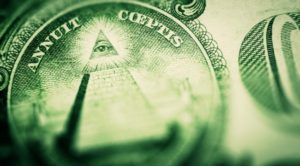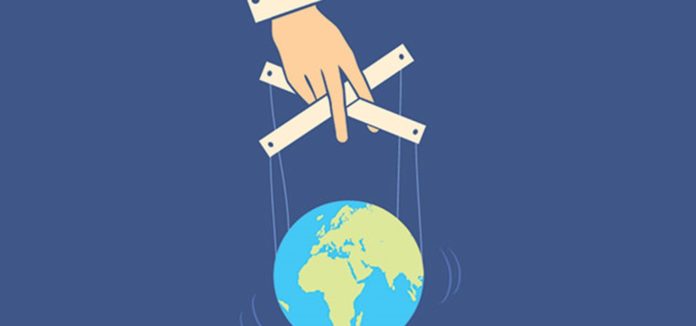MMT is dangerous, but it’s popularity is growing. MMT fluffs over some incredibly complicated subject matters, making it easy to drag people into the weeds, and MMTers take advantage of this to confuse people. Their goal is not to win debates, but to prevent the masses of the public from listening to the conversation. MMT wants you to tune out from facts and reason, so that you will listen to the siren song of ‘free’. The goal of this editorial is to arm you with the tools to refute MMT, once and for all.
If you have not heard of Modern Monetary Theory (MMT), you have not been paying attention to the left. MMT is based on the facts that 1) US debt is held in US dollars, and repaid with US dollars, 2) that the US government can print as much money as it needs, and 3) that because taxes are paid in US dollars, taxation can be used to deplete the supply of money, and in doing so, prevent inflation.
 That’s actually all true. US debt is held in US dollars, which the government has the power to print in any amount it wants, and taxes are paid in US dollars so taxes could be used to reduce the supply of money, and prevent inflation.
That’s actually all true. US debt is held in US dollars, which the government has the power to print in any amount it wants, and taxes are paid in US dollars so taxes could be used to reduce the supply of money, and prevent inflation.
MMTers will tell you that these three facts are revolutionary, but they are not. These ‘revolutionary facts’ are nothing more than traditional monetary policy looked at in reverse order.
We are told, traditionally, that government has no money of its own, and so it must tax what it spends. Deficit spending, we are traditionally told, leads to inflation. MMT does not change that. All MMT does is to look at the coin from the other side, looking at spending first and taxation second. It really does not matter what order you look at spending and taxation as long as government taxes what it spends. Whether government ‘spends $10,000 into existence’ to fund a project and then taxes you $10,000 to ‘prevent inflation’, or taxes you $10,000 to pay for some project that cost $10,000, the end result is the same – a government project got funded, and you are out $10,000.
In that sense, MMT is a word game, like scrabble. It changes nothing.
But it confuses everything.
Once MMTers confuse you by reversing the order they look at taxing and spending, they begin to blur the line between growth in the money supply and inflation. They’ll point to Japan and say, “look at all of the debt in Japan – where is the inflation?”, while ignoring the complex economic circumstances Japan is in.
I’ll answer the question, “where is Japan’s inflation?” and in doing so, I’ll dismantle MMT.
Japan fueled it’s post WWII growth through mercantilism, selling products, often for less than they cost to produce, primarily to the United States. Japanese companies were paid in US dollars, which need to be converted to Yen before they can be spent on the streets of Tokyo. In order to convert dollars to Yen, companies need someone willing to trade Yen for dollars, and nobody is going to do that unless they can then spend those dollars somewhere. Dollars can only be spent in the United States, and so Japan has to buy US goods and services in order to sell products to the United States. Trade is reciprocal.
Our currency is a bit unique, being the global reserve currency. Oil is, for example, traded in dollars. As a result, Japan can buy oil from, say, Saudi Arabia, in US dollars. But that does not really change anything since then Saudi Arabia has dollars that have to be spent in the United States. Trade is still reciprocal on a global scale. Eventually those dollars have to be spent on US goods and services.
Japan did not want trade to be reciprocal, so they looked for anything they could buy in dollars, other than US goods and services. Their government bought trillions of dollars of US debt. Japan bought US real estate, particularly cattle farms. Japan bought buildings and invested in houses. Japanese people and firms at one point in time owned almost half the state of Hawaii. Japan bought whatever it could in US dollars, other than US goods and services.
Japan did what used to be called ‘The Old Texas Two Step’: Japanese businesses sold products in America and got paid in dollars, and then their government converted those dollars into Yen. Japan printed Yen to do that. Like us, Japan has a debt-based monetary system, where their central bank creates money by buying government debt. As such, Japan backed the Yen they printed, and the debt they created to print that Yen, in US treasury notes. This allowed our government to create huge deficits, while also allowing the Japanese people to buy Japanese goods and services rather than American goods and services.
So why hasn’t Japan seen inflation? Because they can’t see inflation until they begin spending the dollars they are holding on to, in US savings bonds. That’s bad on both sides of the Pacific, as the dollars they are holding onto in US savings bonds represent money our government already spent. When Japan sells those savings bonds, we’ll see inflation on both sides of the Pacific. And it’s not just savings bonds. Japan also bought property in the united States. If Japan sells that property, they’ll get dollars that they’ll have to spend.
China, by the way, did the same thing Japan did, but China is larger than Japan and has pushed the envelope even further. All told, foreign governments hold $6.06 trillion in US debt. All of that debt represents inflation in both the countries holding US debt, as well as in our economy.
World governments have created the bubble of all bubbles – buying debt held in fiat currencies, to keep money out of circulation, growing entire economies as bubbles, and holding onto ever higher levels of debt, held in foreign denominations, to prevent inflation. That is why Japan has not seen inflation, and why a lot of other countries have not seen inflation, but it’s a bubble, and when the bubble bursts, the wheels come off.
Inflation is really a very simple concept to understand. If I have an economy consisting of nothing but four apples and four dollars, how much will each apple cost? If you said, ‘one dollar,’ you would be correct. Now, let’s say I keep the number of apples steady, but I double the number of dollars to eight. How much will each apple cost? If my economy consists of just dollars and apples, the value of the dollars and apples must always be equal. If I have eight dollars and four apples, each apple will cost two dollars. That’s inflation.
Inflation really is that simple. The size of our economy is measured in dollars, but the actual wealth those dollars represent is the totality of goods and services produced. If we grow the number of dollars faster than we grow the totality of goods and services produced, we see inflation, and though inflation does not always occur right away (sometimes it takes decades), that is not because inflation is complicated, but because our economy is complicated.
In our example of four apples and eight dollars, let’s say someone starts adding grapes to the economy. How many grapes are there? What is the demand for grapes relative to the apples? Nobody knows, so we go through a period of price discovery to find out. During that period, the value of apples and grapes will fluctuate. We may see a recession. Eventually, prices represent the number of apples and grapes we have, the demand for apples and grapes relative to one another, and the number of dollars in the economy. Prices stabilize. Nobody has to know how many apples, grapes, and dollars there are, or what the relative demand of grapes and apples is. Prices will eventually find the optimal level anyway, all on their own. Even if all of these variables are constantly changing, as long as the changes are gradual, pricing will always be right behind, adjusting to keep up. As you add more and more variables, making the economy more and more complex, the exact nature of how inflation works through the economy, and the amount of time it takes, can also become more complex, but the basic dynamics of how inflation works, really is quite simple.
Back to MMT…
The world economy is largely a bubble, created by activist governments who do not understand that the real economy is organic, based on every day people living their every day lives, working jobs to make money, and then using that money to buy the goods and services they need and/or want. ‘We the people’, and everything we do – that IS the economy. Everything else is a bubble.
There are some legitimate government services, and to the degree that they are legitimate, spending on them is also part of the organic economy. To the degree that we need a military, military spending is a part of the organic economy, but Hitler built Germany’s economy in the 1930s almost entirely on a war footing, which was a bubble. At some point, Hitler either had to stop building a military he did not need (causing the German economy to collapse), or he had to create demand. As a consequence, even had Hitler not wanted to start World War Two, Germany’s economy would have forced him to.
If we over-spend on police, the need to create demand will force us to over-police, sending more people to jail, creating a prison bubble. If we spend too much on education, we’ll create a college tuition bubble. If we spend too much on healthcare, we’ll create a healthcare bubble.
You might notice that I’m bringing up bubbles we already have. MMT says, “Go ahead and spend the money! What could happen?!?” The answer is that bubbles burst, and cause recessions.
Governments have gotten better, over time, at managing bubbles. They have learned from experience, all kinds of new ways to prop bubbles up larger than ever before, and to keep them going longer than anyone ever before dreamed possible. That’s only a good thing until they burst, and then we find that government has done nothing more than to create larger recessions than ever before, which they can only ‘fix’ by creating the next bubble, sewing the seeds for the next recession. Government has not cured the ‘boom and bust cycle’ of free market economies. They have only made it worse.
Organic growth – everything that drives healthy economies – does not come from government. It comes from you and me. It comes from real people interacting with each other, freely, in the real world. MMT does not see that. To MMT, government spending is the source of everything. MMT mistakes bubbles with true economic growth.
The problem with bubbles is that they are enticing. I can remember living in the Grand Rapids area during the 1990s, when Grand Rapids wanted to rebuild it’s decaying economy. They decided to build primarily on healthcare, and courted a lot of healthcare companies. But healthcare does not grow an economy. Healthcare only maintains it. You don’t go to the doctor to become better than you were before, but to become the same as you were before, and though a breakthrough in medicine that makes it cheaper to be the same as you were before, can free up money for other things (growing the economy), when healthcare grows as a government sponsored bubble, and becomes more expensive rather than less, that may grow Grand Rapids, but it does so at the expense of people living elsewhere.
MMT makes government spending the center of everything, and in doing so, MMT takes everything over. You want healthcare? Government will spend you healthcare. You want food? Government will spend you food. You want clothing? Government will spend you clothing. You want a car? Government will spend you a car.
This brings up the worst – perhaps the fatal flaw – in MMT: MMT assumes that wherever you have demand, supply will invariably follow. This is absurd. If you tax those who produce to pay for production, why would they continue to produce? Venezuela can answer that, and you can tell this is true when you hear socialists explain Venezuela – they’ll say that it was a conspiracy of angry capitalists that destroyed Venezuela, by refusing to produce. Take away the word, ‘conspiracy’, and that is exactly what one would predict – if you destroy the incentive to produce, people will stop producing, and the economy will collapse. No duh! Venezuela is the epitome of MMT thinking, carried out to its logical conclusion. Even while sitting on the world’s largest proven oil reserves, Venezuela could not make it work.
MMT is dangerous, but it’s popularity is growing. MMT fluffs over some incredibly complicated subject matters, making it easy to drag people into the weeds, and MMTers take advantage of this to confuse people. Their goal is not to win debates, but to prevent the masses of the public from listening to the conversation. MMT wants you to tune out from facts and reason, so that you will listen to the siren song of ‘free’.
Those who listen to siren songs crash on the rocks.
EDIT: In responding to some of the comments below, I ended up writing a second post, that clarifies the exact relationship between debt, inflation, and trade. What I wrote above fluffs over that relationship, and it’s a complex relationship, so clarifying it became a new post: http://thedailylibertarian.com/free-trade-without-agreements/.
As always, if you agree with our message, please help us to grow our reach with the share buttons below!!























AOC has recently picked up on MMT and is actively talking about it in very simplistic and babyish terms. The term “economically illiterate” comes to mind.
[…] to use massive levels of deficit spending – which many of them think is OK (they call this Modern Monetary Theory), and even without massive spending increases, any global recession would reduce demand for US […]
In a democracy, taxes are a tool that carry out the democratic decision to execute group projects; they transfer goods and services from the private to public sector, as agreed upon by the House of Representatives. No more, no less.
The bubbles that worry you so much are caused by private sector debt and financialization. They are the result of poor oversight allowing an always-ready-to-cheat financial sector grow larger than what serves to finance productive investment.
Your knee-jerk aversion to the public recognizing the efficiency of carrying out certain types of projects that are more efficiently carried out at the public level is strangely anti-democratic. Natural monopolies and networks are most efficiently executed by the public; there is no way to put value on a person’s health, so healthcare also has no private market solution.
Further, your knee-jerk aversion to real economics allows the financial sector to continue defrauding the public, since writing like yours diverts attention from the real solutions to our economic under-performance, which is a) proper oversight of the financial sector and b) to allow the House of Representatives to carry out the public’s choices to efficiently maintain and run our failing infrastructure, networked industries (communications etc), and healthcare in the most efficient and well-being optimizing manner. You are stuck in the dark ages economically.
1000 CASTAWAYS: How To Make An Economy…And How Not To (2018, Clint Ballinger)
Clint – It might surprise you to know that we do not live in a democracy. In a democracy, the majority can do whatever it wants. France tried true, pure democracy, immediately after the French Revolution, and it led to the guillotine, and lots of lost heads. There is absolutely nothing in the American political tradition that says that the majority can do whatever it wants, and in fact we created a very limited government specifically to ensure that the majority was very limited in what it could do. As such, taxes are legitimate when they are used to perform legitimate government functions, as specified in the Constitution (Article 1, Section 8 lists the specific powers). Taxes levied for other purposes are not legitimate, as out government does not have any legal authority to use those ‘tools’, as you call them.
There are certainly some things that are better done collectively. I cannot imagine what a private, for-profit Army would look like, or at least I can’t envision something like that being in any way ‘good’. Obviously, national defense is best done collectively. At the same time, what would our society look like if cars were all made collectively, or if food were all made collectively? We have seen amble examples of such solutions with things like cars and food, and the result is always the same – people go without food, and without cars. There is a reason for example that 14 million people starved in the Ukraine in the 1930s, and that over 100 million starved in Mao’s China. Calling my disinterest in that sort of thing a ‘knee-jerk reaction’ shows a serious lack of empathy for those who starved at the hands of collectivism, as well as a serious lack of historic understanding regarding the political and economic events of the past century.
I find it somewhat funny that you would show such complete ignorance of recent history (and economic history at that) and then would tell me that I have a knee-jerk aversion to real economics. I am going to suggest that whatever you knowledge you think you have about economics was discredited as soon as you called taxation a ‘tool’ used to ‘transfer goods and services from the private to the public sector.’ Taxes do nothing of the sort. Taxes transfer one thing, and one thing only, from the private to the public sector, and that one thing is labor. When the government taxes you, they are quite literally taking the value of your labor and seizing some of it. Taxes do not take goods and services from you. Taxes, rather, reduce your ability to purchase goods and services. THAT is what taxes are – nothing more, and nothing less.
Have you considered that when you say there is no way to put a value on a person’s life, you are also allowing government to determine which lives matter, and to determine how much to value each life. We currently have the best medical system, delivering the best medical care, on the planet, and by a wide margin. You may say that we do not have the best HEALTHcare system, but healthcare includes such things as diet and exercise, and it is hardly the fault of your doctor if you are fat and lazy, as many Americans, sadly, are. If you thought you might have cancer, would you want to wait for a government bureaucrat to decide to let you see a doctor? You might have to wait some time, as those who are already diagnosed will necessarily take priority. Do you want an MRI done when one might be beneficial, or only when whatever might be wrong with you is serious enough to warrant letting you get an MRI rather than someone else? You want to talk about knee-jerk reactions? Look at the cavalier nature you dismiss free market healthcare with. You literally said that because it is impossible to put a value on a person’s health, there is no private market solution. That statement 1) does not answer the question of putting a value on a person’s health in a public system (which bureaucrats will have to do), and 2) does not even consider which system (private or public) might be better equipped to provide more medical care, more efficiently, with a higher level of quality, to more people. While you blithely throw around moral judgments about ‘value’ solutions, people die. I hope your moral rectitude is worth more than those lives.
I could spend days talking about our financial sector. You rightfully blame it for defrauding the public, but you make no mention for how (or why) they do so. The FDIC socialized bank risk, and yet when banks gamble, the rewards are still private. Free markets are about profit AND LOSS, so how can you call the financial markets ‘free market’ when the risk of loss has largely been removed? And who removed it? Government.
Can you name me ONE THING our congress does in an efficient, optimized manner?
Clint – I am sorry, but you believe a great many things that are not true, and ignore a great many things that are. You have no idea what you are talking about.